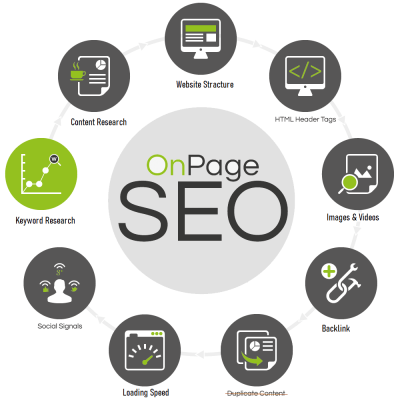What is On page SEO?
On-page SEO (also called “Nearby SEO”) is the improvement of website page content for web crawlers and customers. Normal on-page SEO exercises include improving title labels, content, internal links, and URLs.
This is not the same as off-page SEO, which is used for signals that occur outside of your website (such as backlinks).
For what reason is On page SEO important?
Does the usual on page SEO have an effect in 2021?
To be honest, Google’s own report “How Search Works” expresses this. Despite the fact that Google is MUCH smarter than they were sometimes ago, they actually use old-school stuff (like searching for a specific keyword on your page). However, if you search for an aggressive keyword, you’ll find that the top-level pages virtually all use that exact keyword in their title tag.
That said:
On page SEO has something else to offer than putting keywords into the HTML code of your page.
To value your substance, you additionally need to update your substance for:
- Customer Experience
- Ricochet rate and dwell time
- Search intent
- Speed when stacking pages
- Active click factor
Use your target keyword in the first 100 words
This is an old-fashioned on-page SEO strategy that works. You should simply use your primary keyword once in the first 100-150 phrases of your article. For example, in my article that revolves around the keyword “email presentation”, I referenced this keyword first.
For what reason is this important?
Google puts more weight based on terms that appear from the get-go of your page. Which seems to be fine. Imagine you just distributed an article about the keto diet. Assuming your article was really about the keto diet, would it be worthwhile to use the phrase “keto diet” initially mainly on the page? Therefore, you need to put your keyword in a place in the first 100 words or something similar. This is one of those easy-to-miss details that help Google figure out what’s really going on with your page.
Include your blog post title with an H1 tag
The H1 tag is like a scaled-down title tag. In fact, Google has expressed that using an H1 tag “helps Google understand the structure of the page”. Most platforms (like WordPress) therefore add the H1 tag to your blog post. If that’s the situation, you’re good to go. However, this is generally not the case. You need to look at your site’s code to make sure your title is wrapped in an H1.
Also, that your keyword is within that H1 tag.
Include subheadings with H2 tags
Think of your objective keyword for somewhere around a subheading. Also include that subheading with an H2 tag.
Will an H2 label be the defining moment for your on-page SEO?
Probably not. Still, it can’t do any harm. Furthermore, our own SEO tests have shown me that including your objective keyword with an H2 tag can make an impression. Here is an illustration of this technique in real life (target keyword =” content showcasing apparates”):
What is Keyword frequency?
Losing frequency is very similar to how it sounds: it’s how often your catchphrase shows up in your substance. Google might decline that utilizing a similar term on different occasions makes a difference. In any case, SEO aces with experience will let you know that it certainly works.
Conclusion
Imagine you have a page that Google thinks is about a certain keyword. However, that keyword only appears once on the page.
How sure would they be able to be that the site is concerning this buzzword? Not very.
Assuming the page gives the keyword more than once, Google may be more confident about the topic of that page.





